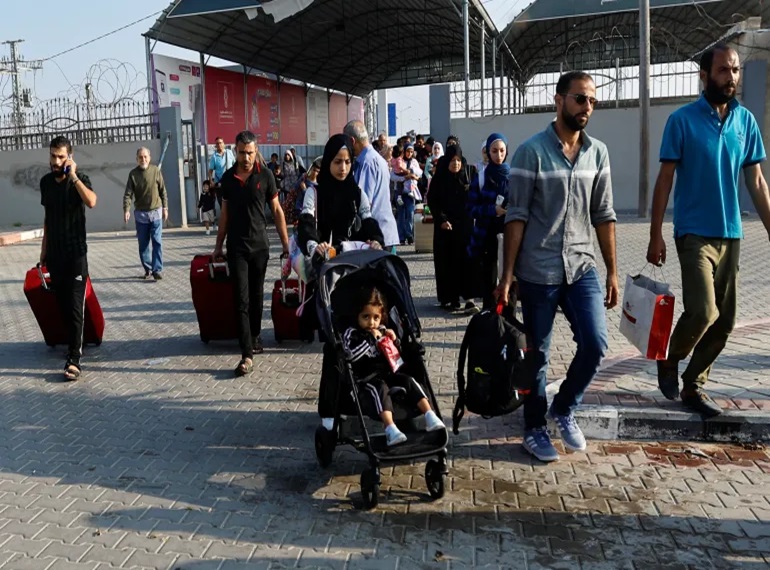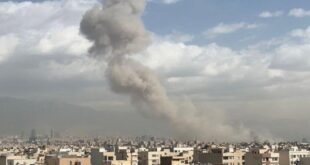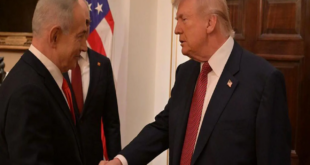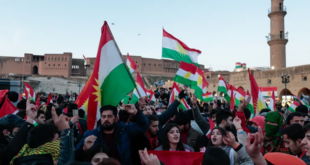
Analysts say Egyptian President Abdel Fattah el-Sisi fears instability at home if Palestinian refugees cross the border.
Egypt’s President Abdel Fattah el-Sisi appears unlikely to absorb the 2.2 million Palestinians who could be displaced from the Gaza Strip during the Israel-Hamas war, experts have told Al Jazeera.
“My assessment is that it is a 95 percent non-starter,” said Nancy Okail, president and CEO of the Center for International Policy, a progressive nonprofit in Washington, DC.
“The political cost outweighs any of the benefits,” she added, pointing to the potential for domestic unrest in Egypt if an influx of Palestinian refugees were to arrive.
But the prospect of a mass displacement from Gaza – a narrow, densely populated territory on Egypt’s northeast border – has heightened concerns in el-Sisi’s government.
On October 24, +972 Magazine and its sister publication Local Call reported on a leaked document allegedly from Israel’s Ministry of Intelligence, outlining a proposal to “evacuate” all Palestinians from Gaza to Egypt.
Rumours are also swirling that Israeli leaders are attempting to entice Cairo into accepting displaced Palestinians by offering to write off some of its bloated external debt, which hovers at about $160bn.
In addition, Israeli Prime Minister Benjamin Netanyahu has reportedly lobbied European leaders to help him convince el-Sisi to take in refugees from Gaza — an idea he has so far rejected.
“It is entirely understandable why the Egyptians and Palestinians fear that there are Israeli leaders that seek to forcefully and permanently displace Palestinians from Gaza,” said Timothy Kaldas, an expert on Egypt’s political economy for the Tahrir Institute for Middle East Policy.
He added that Palestinians should still be granted the right to seek asylum in neighbouring countries, a protection that Egypt and Israel are denying them.
“Palestinians should still have the choice – and I emphasise the choice – to move into Sinai and seek safe haven. They should not be forced to be subjected to indiscriminate bombardment in Gaza,” Kaldas told Al Jazeera.
A high ‘political cost’
A majority of Palestinians were expelled from their homeland in 1948 during the creation of the state of Israel — an event they refer to as the Nakba, or “catastrophe”.
Most people in Gaza today are the children or grandchildren of those displaced during the Nakba. They now risk being permanently uprooted again, which is a war crime under international law.
The question of Palestinian rights has always been a popular cause in Egypt, according to Okail. If el-Sisi acquiesces to pressure to absorb Gaza’s population, he could trigger widespread outrage and protests.
“The political cost [for aiding the displacement of Palestinians] could be el-Sisi’s presidency,” Okail told Al Jazeera.
Such a move, Okail said, would likely be interpreted as helping Israel to expand and entrench its occupation of Palestinian territories. Any resulting unrest could prompt the military to topple el-Sisi in order to restore order, she added.
“Any expression of dissent in the public domain in Egypt is going to be highly sensitive for the army,” Okail said. Its members “are known to be completely against the idea of allowing the Palestinians to be removed from their land and into [Egypt]”.
Security dilemma
El-Sisi has also articulated concerns that accepting refugees from Gaza might invite Palestinian fighters to take root in Egypt.
During a meeting with German Chancellor Olaf Scholz on October 18, el-Sisi made the case that Palestinians dislodged to Egypt’s Sinai region may establish a “new base” to carry out “terrorist operations”.
“Israel would have the right to defend itself and its national security and therefore directly strike Egyptian lands,” el-Sisi said.
This scenario threatens to upend the peace deal between Egypt and Israel, brokered by the United States at the Camp David Summit in 1978.
Kaldas believes that el-Sisi’s security fears are legitimate. He added that Egypt is probably more worried about the arrival of smaller armed groups than Hamas, the Palestinian organisation whose surprise attack on Israel helped spark the current war.
“That’s not to say they’re not worried about Hamas, but they have a more clear and direct relationship with the group,” Kaldas told Al Jazeera.
Since 2016, relations between Egypt and Hamas have thawed. The two sides first cooperated to crack down on cells from the ISIL (ISIS) group. Then Egypt resumed mediating ceasefires between Hamas and Israel – a role that has restored some of el-Sisi’s regional influence.
But el-Sisi’s government is still wary of Hamas due to its heavy military arsenal and its affiliation with the Muslim Brotherhood, a group it vilified and repressed to consolidate power in Egypt.
What’s more, el-Sisi may believe the arrival of armed Palestinian groups could inspire youth, disenfranchised by Egypt’s economic crisis, to join their ranks, according to Okail.
“Many of these people frankly have nothing to lose and may be tempted to join,” she told Al Jazeera.
An opportunity amid the pressure
Though el-Sisi has so far resisted calls to accept displaced populations from Gaza, some experts believe the Egyptian president is nevertheless using the situation to his advantage.
Hossam Bahgat, the founder of the Egyptian Initiative for Personal Rights (EIPR), told Al Jazeera that el-Sisi’s government is using Western support for Israel to argue it would be hypocritical to criticise human rights abuses in Egypt.
“Pro-regime figures on social media are highlighting how all the Western talk about human rights for the last 10 years — all the US congressional oversight and conditioning of military aid — was just part of a Western conspiracy to weaken the state,” Bahgat told Al Jazeera.
Countries like the United States have documented “credible reports” of human rights abuses in Egypt, including torture, extrajudicial killings and forced disappearances. El-Sisi’s government, however, has denied those charges.
But Bahgat said the pressure some countries are placing on Egypt to potentially allow the forced displacement of Palestinians – a grave crime – will give el-Sisi greater cover to commit human rights violations domestically.
“The regime won’t even have to be mindful of its image,” Bahgat said.
SOURCE: AL JAZEERA




 World Opinion | Alternative Média Débats De Société, Questions, Opinions et Tribunes.. La Voix Des Sans-Voix | Alternative Média
World Opinion | Alternative Média Débats De Société, Questions, Opinions et Tribunes.. La Voix Des Sans-Voix | Alternative Média




